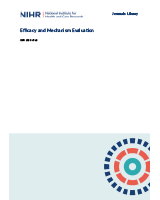NCBI Bookshelf. A service of the National Library of Medicine, National Institutes of Health.
Brown LC, Fisher D, Adams R, et al. Molecular selection of therapy in metastatic colorectal cancer: the FOCUS4 molecularly stratified RCT [Internet]. Southampton (UK): National Institute for Health and Care Research; 2022 Dec. (Efficacy and Mechanism Evaluation, No. 9.9.)

Molecular selection of therapy in metastatic colorectal cancer: the FOCUS4 molecularly stratified RCT [Internet].
Show detailsBackground
Colorectal cancer is not just one homogeneous disease; there are subsets within the disease that behave differently, respond to drugs differently and can be identified by carrying out laboratory tests on the cancer. FOCUS4 was a trial that aimed to test various new drugs in these differing subgroups of patients in a way that was efficient and flexible to new and emerging discoveries.
The FOCUS4 trial enrolled 1434 patients from 88 hospitals. All patients received 4 months of first-line combination chemotherapy treatment in their local hospitals. Patients with stable or responding disease at the end of that period were eligible for randomisation into the subtrial that was relevant for their molecular subtype or into the non-stratified trial, FOCUS4-N. We then measured the time from randomisation to the time when the cancer showed signs of growing again (progression-free survival) and the active arms were compared with either placebo or active monitoring.
What has FOCUS4 shown?
We found two positive results and one negative result, and had one study that did not recruit well so was closed. FOCUS4-C showed that a Wee1 inhibitor, adavosertib (AstraZeneca Ltd, Cambridge, UK), was well tolerated and improved progression-free survival in a common subgroup of colorectal cancer that carried mutations of two genes. FOCUS4-N showed that the oral chemotherapy tablet capecitabine also improved progression-free survival. FOCUS4-D was the first molecular cohort to report from FOCUS4 and showed comprehensively negative results, and was closed after only 32 patients had been recruited. FOCUS4-B tested aspirin in another subgroup of patients, but only six patients agreed to be randomly allocated to aspirin or placebo – perhaps reflecting the fact that, for a freely available simple drug, it is difficult for patients to agree to being randomly allocated when they can buy it in a pharmacy. We have shown that this complex trial is possible but that there are a lot of challenges.
- Plain English summary - Molecular selection of therapy in metastatic colorectal ...Plain English summary - Molecular selection of therapy in metastatic colorectal cancer: the FOCUS4 molecularly stratified RCT
Your browsing activity is empty.
Activity recording is turned off.
See more...